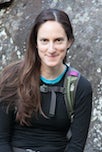
When Kate Siber decided to leave her stable reporting job at Outside Magazine for an uncertain career as a freelance journalist, she took the plunge with trepidation. “Everybody told me it was a bad idea including my boss; she thought I was going to live in a cardboard box,” said Siber, an alumna of Metcalf’s 2016 Annual Science Immersion Workshop for Journalists. “It was probably one of the hardest decisions I’ve ever made.”
A decade later, sitting in her office surrounded by snow-capped mountains in Durango, Colorado, Siber says she’s glad she took the plunge. She still contributes to Outside Magazine as a correspondent, but her work also appears in numerous publications including National Geographic Traveler, National Parks, The Washington Post, and The Boston Globe.
Siber takes a down-to-earth approach to her writing that draws the reader in, delivering accurate and well-researched, yet accessible stories on a range of topics including travel, science, the environment, and sustainable development. In a travel piece for High Country News about new research on skiers and the dangers of avalanches, Siber began with a first-hand account of a massive avalanche she witnessed, then she weaved in the science. “I stood there in awe and terror, my heart racing, glad to be alive,” she wrote.
Siber took a similar approach to a science-packed story about a controversial plan to bring tar sands oil through the Great Bear Rainforest in British Columbia. “Greg Shea knelt down and inspected several football-size mounds of upturned earth. ‘This is fresh,’ he said in a whisper. ‘That’s bears digging for roots.’ He paused, looking around as if inspecting a crime scene, senses heightened for clues.”
“I love bringing more personal aspects into it,” said Siber of her unique writing style. “Journalism at its best informs, but also inspires us to look at our lives differently.”
With solid experience in journalism and an undergraduate degree in English, from Dartmouth College, cum laude, Siber sought to strengthen one of her weaknesses when she applied for the Metcalf Fellowship. She needed a better understanding of the scientific process and how scientists conduct their research.
“The workshop gave me the confidence and the tools to learn what’s needed to tell these stories, and that’s really important to me,” she said. “In the past, I would have asked these questions anyway, but I just feel better and more confident that my curiosity will lead me to the place I need to go in order to accurately report these stories.”
Siber’s work has been honored by The North American Travel Journalists Association and the Society of American Travel Writers, which named her a travel journalist of the year in 2011.
As Siber looks towards the future, she would like to write longer feature stories that require more research for national publications on a broad range of science and policy issues, from public lands and wildlife management to new research on the effects of sensory pollution, the human relationship to wild places, and developments in paleontology.
“My hope is that I can use my ability to weave interesting stories to get people engaged in issues that really matter.”
Read stories by Kate Siber
Can a Water Plan Actually Work?
Ghost of a Chance
South of Georgia: the Last God Forsaken Place
